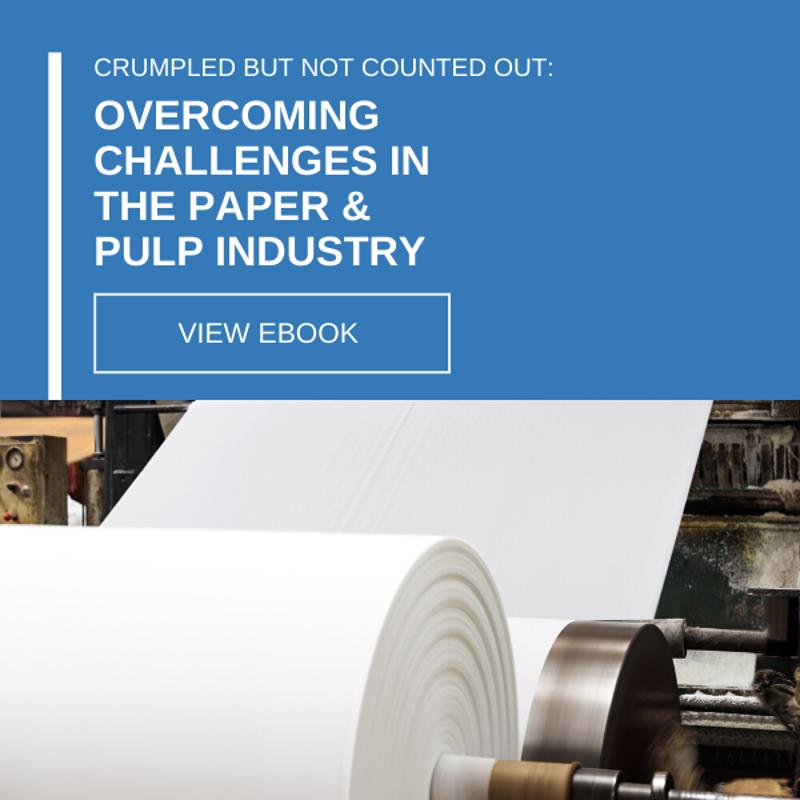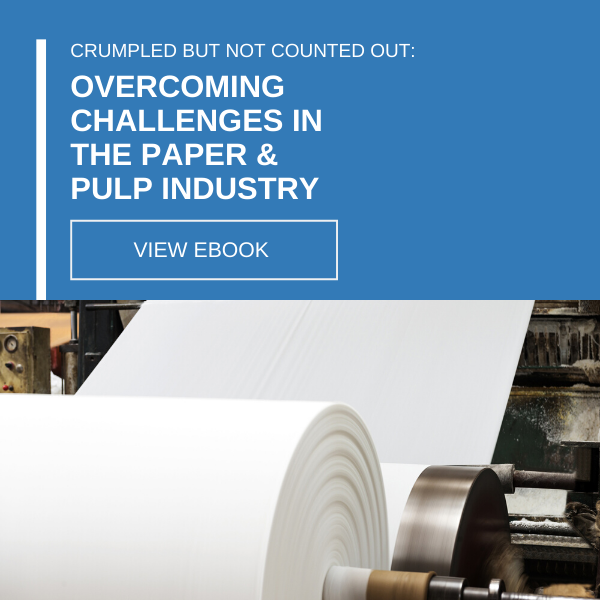
How Can Paper Producers Rise to the Production Challenge?
The novel coronavirus has produced a lot of uncertainty, and for manufacturers in the pulp and paper industry, that includes uncertainty related to demand.
Stores unsurprisingly sold out of the typical products like soaps, hand sanitizers, and spray cleansers, but disposable tissue paper – of all things – was even more difficult to come by, both in the U.S. and worldwide. Indeed, in April, the paper towel market grew a whopping 264% on a year-over-year basis, according to ResearchandMarkets.com, a jump spurred in part by fears of germs clinging to reusable cloths, which could then spread.
For the most part, the pulp and paper industry was able to make the necessary adjustments, as formerly hollowed-out store shelves are full once again. However, as researchers point out in a recent article, heightened demand for paper products is poised to continue for the foreseeable future, a reality that will force manufacturers and shippers to optimize their supply chains if they are to satisfy the long term surge in demand.
Paper use up dramatically
According to the piece published in North Carolina State University journal BioResources, the growth in demand for pulp and paperboard thus far in 2020 has been unprecedented, with production topping 419 million metric tons and consumption reaching over 423 million metric tons worldwide.
“Demand for pulp and paperboard thus far in 2020 has been unprecedented.”
While the growth in toilet paper and paper towels use received much of the attention from the media – attributed largely to panic buying – NC State researchers note the growth was almost across the board, including for such things such as food packaging, corrugated packaging materials, and paper-based medicinal materials and devices.
“During the COVID-19 outbreak, corrugated packaging materials are essential for the transport of food, medicines, and medical equipment,” the authors wrote. “In addition, the self-quarantine may accelerate the growth of online shopping in this emergency period.”
Online sales have indeed proliferated over the past several months, a rare bright spot as the shutdown rocked numerous industries. In March, for instance, online sales rose 25% and online grocery shopping soared 100% in terms of daily receipts, USA Today reported from a study done by Adobe Analytics.
Among the items consumers bought in droves were face masks, many of which are made from specialty paper. Purchases for such virus protection products – including hand sanitizers and disposable gloves – jumped 807% in March, USA Today reported from the data.
“We’ve all seen the memes and photos of what some store shelves look like as people prepare for the worst,” Nate Smith, group manager of product marketing at Adobe Analytics, said in March. “Add to that the fact that many people are also trying to avoid large gatherings and public places, and it’s easy to see why online shopping for COVID-19 related items is up.”
Out of an abundance of caution
In the interest of safety and improving Americans’ sense of security amid rampant uncertainty, several states around the country have implemented mask mandates, such as Washington, Maine, Massachusetts, California, Texas, and Rhode Island. Indeed, numerous retailers have implemented policies that require customers to wear them, including Target, Best Buy, Walmart, and Costco.
For its part, the National Retail Federation has called on retailers of all sizes to follow big box stores’ example by installing their own mandates regarding face coverings.
“Workers serving customers should not have to make a critical decision as to whether they should risk exposure to infection or lose their jobs because a minority of people refuse to wear masks in order to help stop the spread of the deadly coronavirus,” NRF said in a statement issued July 15.
“The sanitary paper product manufacturing market may near $108 billion by year’s end.”
With stores and governments globally taking similar measures, sanitary paper product output is expected to pick up the pace, even more than it has already. Worldwide, the sanitary paper product manufacturing market may near $108 billion by year’s end, up from just shy of $66 billion in 2019, according to forecasts from Research and Markets.
For these reasons and more, “unprecedented opportunities” are in the offing for the pulp and paper industry, according to NS State University researchers. In addition to specialty paper being used for face coverings, it can also be leveraged for various medical products, such as microfluidic chips, bio sensors, electrodes, and biological test paper. Furthermore, the authors point to the growing interest in biorefinery processes, which can be used in biomedical applications like drug delivery, wound dressing and tissue engineering.
“The COVID-19 pandemic is posing serious challenges to the pulp and paper industry due to its disruption to global industrial supply chains,” the researchers said in their conclusion. “However, it has potential to create positive demand for a variety of paper products such as personal hygiene paper products, food packaging products, corrugated packaging materials, and medical specialty papers. Thus, traditional pulp and paper manufacturing operations are expected to be transformed, upgraded, and integrated to reduce the risks associated with this pandemic.”
How Charmin rose to the occasion
Producers may want to draw from toilet paper giant Charmin’s example for guidance. As ABC News reported, when toilet paper sales skyrocketed in March and April, Proctor & Gamble, which owns Charmin, was able to ramp up production without jeopardizing the health of its workers. The company did this by issuing personal protective gear not just to staff on the assembly line, but for anyone that entered its plants. P&G Human Resources Director Tommy Montoya told ABC News that this strategy enabled the company to operate around the clock – 24 hours a day, seven days a week – all while seamlessly isolating workers should they get sick since the plants are structured as zones, making them easier to cordon off if necessary.
Whatever your line of work, an efficient, fully optimized supply chain is more important than ever. USC Consulting Group can help you make it better than ever. Contact us today for efficiency improvements done right.






